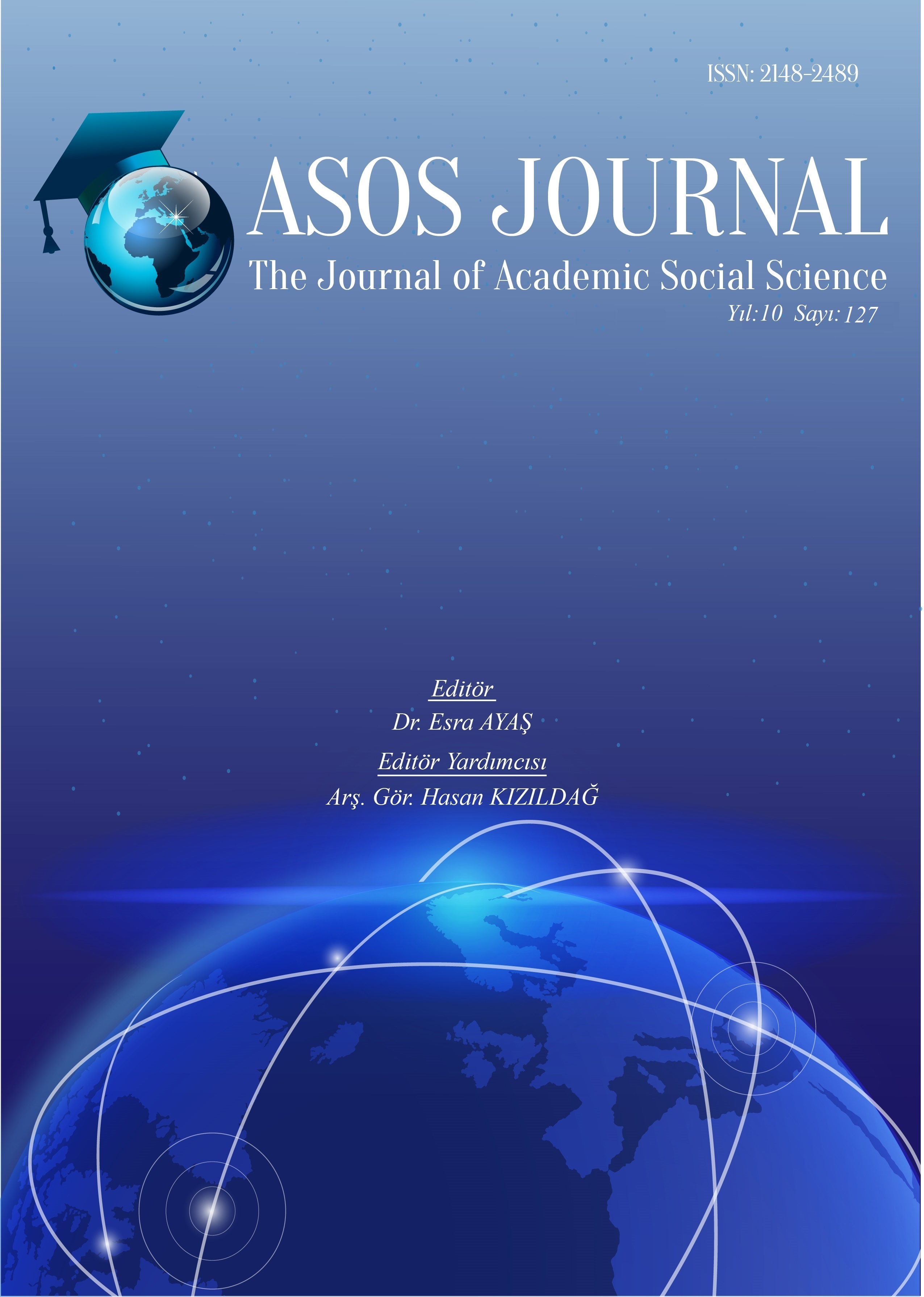ORTAÖĞRETİM KURUMLARINDA BİLGİSAYAR TEKNOLOJİLERİ KULLANIMININ COĞRAFYA EĞİTİM ÖĞRETİMİNE ETKİSİ:DİYARBAKIR ÖRNEĞİ
Author :
Abstract
Bilgi ve iletişim teknolojilerinin hızlı gelişimi toplumsal ihtiyaçlara yanıt olma/kolaylaştırma özelliği ile birçok farklı alandaki gelişmeleri yönlendirmekte ve etkilemektedir. Bu durum eğitim alanında da yaşanmaktadır. Özellikle zaman içerisinde yetersi kalan eğitim/öğretim materyalleri teknolojik gelişmelerin yarattığı imkanlara paralel olarak güncel çözümler üretmektedir. Bu çözümler eğitim-öğretimde hem materyalleri hem de teknikleri üzerinde etkilidir. Eğitim sisteminin hedef kitlesi olan öğrencilerin, bu gelişimle beraber öğrenme ve öğrendiğini uygulamada kullandığı yöntemler geleneksel anlayışın dışına çıkmaktadır. Bu durumun temel amacı ezbere dayalı bilgilerle doldurulmuş bireyler yerine yaratıcı, eleştirel düşünme becerisine sahip, sorgulama becerisi güçlü, bilgi üretmeyi ve kullanmayı becerebilen özgür bireyler yetiştirebilmektir. Bu açıdan bakıldığında öğretmenlere de sorumluluk düşmektedir. Ancak okulların bilgisayar ve bilgisayarlı teknoloji donanımlarının mevcudiyeti, öğrenci profili ve öğretmenin bilgi seviyesi, tecrübesi gibi değişkenler bu aktarımın başarısını önemli ölçüde etkilemektedir. Bu makalenin amacı Diyarbakır il sınırları içinde görev yapan coğrafya öğretmenlerinin bilgisayar ve bilgisayarlı teknolojileri, derslerinde kullanma sıklığını ve kullanma becerilerini tespit etmektir. Toplam 50 öğretmen üzerinde uygulanan anketler sonucunda elde edilen veriler değerlendirilmiştir. Sonuçta coğrafya öğretmenlerinin bilgisayar ve bilgisayarlı teknoloji kullanım bilgi düzeyleri yetersiz olarak tespit edilmiş, derste kullanma sıklıkları ise haftada bir olarak belirlenmiştir. Öğretmenlerin bu konuda ki talepleri, hizmet içi eğitimler ile var olan eksikliklerin giderilmesi yönündedir.
Keywords
Abstract
The rapid development of information and communication technologies directs and influences developments in many different fields with their ability to respond to/facilitate social needs. This is also true in the field of education. Especially, the education / training materials, which remain insufficient over time, produce up-to-date solutions in parallel with the opportunities created by technological developments. These solutions are effective on both materials and techniques in education. With this development, the methods used by the students, who are the target group of the education system, go beyond the traditional understanding when they learn and apply what they have learned. The main purpose of this situation is to raise individuals who are creative, have critical thinking skills, have strong questioning skills, and are able to produce and use information instead of individuals filled with knowledge based on rote learning. From this point of view, teachers also have responsibilities. However, variables such as the availability of computers and computerized technology equipment in schools, student profile and teacher's knowledge level and experience significantly affect the success of this transfer. The aim of this article is to determine the frequency of using computers and computerized technologies in the lessons and skills of geography teachers working in Diyarbakır province. The data obtained as a result of the questionnaires applied to a total of 50 teachers were evaluated. As a result, geography teachers' knowledge level of computer and computer technology usage was found to be insufficient, and the frequency of using them in lessons was determined as weekly. The demands of the teachers in this regard are to eliminate the existing deficiencies with in-service trainings.
Keywords
- Akbulut, G. (2004). Coğrafya ve aktif öğretim yöntemleri. Erzincan Üniversitesi Eğitim Fakültesi Dergisi, 6(1).
- Özel, A.&Taş, H. İ.&-Demirci, A. (2007). Coğrafya Öğretmenlerinin Teknolojiye Bakış Açıları Ve Teknolojiden Yararlanma Seviyeleri. Dumlupınar Üniversitesi Sosyal Bilimler Dergisi, 19.
- Çoklar, A.N.& Makhabbat, A. (2018). Öğretmen Adaylarının Eğitim Teknolojisi Standartlarına Yönelik Özyeterliklerinin Belirlenmesi .INESJOURNAL Uluslararası Eğitim Bilimleri Dergisi, Yıl :5, Sayı 15, s:141-153
- Demirel, Ö. (2012). Öğretme sanatı. Pegem Akademi. Ankara.
- Dereobalı, N., & Ünver, G. (2009). Okulöncesi Öğretmenliği Lisans Programı Derslerinin Öğretim Elemanları Tarafından Genel Bir Bakış Açısıyla Değerlendirilmesi. İnönü Üniversitesi Eğitim Fakültesi Dergisi, 10(3), 161-182.
- Karabağ, S., & Şahin, S. (2007). Coğrafya Dersi Öğretim Programı 2005. Kuram ve Uygulamada Coğrafya Eğitimi, Sayfa, 53-74.
- Kaya, M. F. (2013). Coğrafya Öğrenmeye Yönelik Motivasyon Ölçeği Geliştirme Çalışması. Eastern Geographical Review, 18(30).
- Meşeli, A. (2016) Teknolojik Donanım ve Öğretim Materyallerinin Kullanımı Kaynaklı Sorunlar, Türkiye’de Eğitim Sorunlarına Yönelik Akademik Değerlendirmeler ve Çözüm Önerileri I, (Editör: Recep Aksu) s:85-109, Maya Akademi, Ankara.
- Özey, R., & Demirci, A. (2010). Coğrafya Öğretiminde Yöntem ve Yaklaşımlar. İstanbul: Aktif Yayınevi. Erişim adresi: https://www. researchgate. net ….
- Öztürk, D. S. G. (2008). Innovations in pre-school teacher education in Turkey. Proceedings of International Conference on Educational Sciences ICES, 8.
- Seferoğlu, S. S. (2015). Okullarda teknoloji kullanımı ve uygulamalar: Gözlemler, sorunlar ve çözüm önerileri. Artı Eğitim, 123, 90-91.
- Yılmaz, Z. A., & Mahiroğlu, A. (2004). Dil Bilgisi Öğretiminde Yeni Geliştirilen Öğretim Materyallerinin Öğrencilerin Öğrenme Düzeyine Etkililiği. Türk Eğitim Bilimleri Dergisi, 2(1), 109-123.





